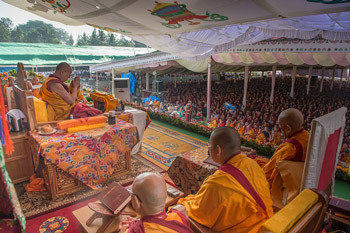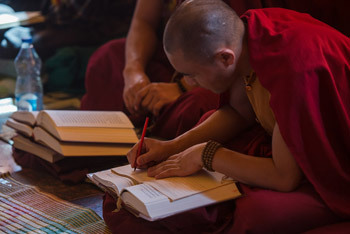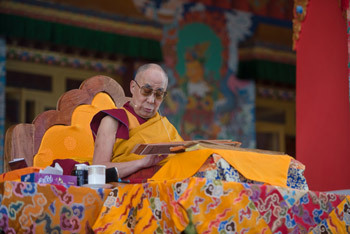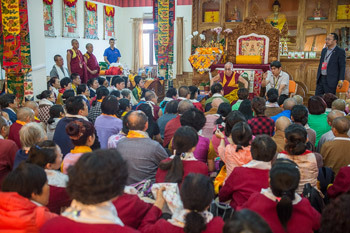Tashi Lhunpo, Bylakuppe, Karnataka, India, 22 December 2015 - Before the start of the morning’s teachings today, His Holiness the Dalai Lama met with more than 150 Chinese. He told them that most religious traditions talk about love and compassion. However, people who believe in God tend to pray to him to seek his help, whereas Buddhism is more focused on doing something for yourself.
“I’ve heard that there are now more than 300 million Buddhists in China,” he said. “If you think of yourselves as disciples of the Buddha you should study. Reciting the name of Amitabha over and over again is not enough. You should note that worthwhile teachers tend not to be concerned about receiving lots of offerings. Also keep in mind that President Xi Jinping remarked in Paris and Delhi that Buddhism has an important contribution to make to restoring Chinese culture.
“Most of our suffering arises because of attachment, anger and ignorance, among which the Buddha taught that ignorance is the source of suffering. How can we overcome it? Not by prayer or the blessings of the Buddha, but by engaging in the Three Trainings of which wisdom is the most important. Wisdom concerns selflessness and you can come to understand it by listening to or reading explanations, reflecting on them and the meditating and making your mind familiar with what you’ve understood.
“The explanation of emptiness doesn’t say things don’t exist, rather that things exist and function as merely designated. We say form is emptiness; emptiness is form because the two are interdependent. We say things are empty because they lack intrinsic existence. You can read about this in Nagarjuna’s ‘Fundamental Wisdom’, which is available in Mandarin and in Chandrakirti’s ‘Clear Words’, which is presently being translated in Taiwan.
“In 1954-55 I spent 6 months in Beijing and met Mao Zedong several times. He took an interest in me and gave me advice about how to promote the welfare of Tibetans in Tibet. At that time he had a positive vision and if that had been followed through, Tibet might not have faced the problems it later encountered. He told me I had a scientific turn of mind, but then added that religion was poison. I think if he were here today and he became acquainted with the Nalanda tradition, he might have thought differently.”
Encouraging the Chinese pilgrims to ask questions, the first was again about emptiness. The second was about the difference between an Arhat and a Bodhisattva. His Holiness answered that an Arhat is someone who has overcome the disturbing emotions by realizing the selflessness of persons. A Bodhisattva has in addition overcome the obstacles to cognition by also realizing the selflessness of phenomena, a realization which is based on the huge collection of merit that results from his or her generating the awakening mind of bodhichitta.
As he was leaving the meeting, His Holiness suggested that if positive attitudes to Buddhism continue to grow in China it might be possible to convene a meeting of Buddhists and scientists like the Mind & Life meeting last week in Sera Monastery.

|
Looking out from the veranda of Tashi Lhunpo Temple at the start of the third day of His Holiness the Dalai Lama's Jangchub Lam Rim Teaching in Bylakuppe, Karnataka, India on December 22, 2015. Photo/Tenzin Choejor/OHHDL
|
Seated once again on the temple veranda, His Holiness referred to the Buddha as a reliable person who had shown us how to avoid negative actions and overcome the disturbing emotions that obstruct liberation. In his ‘Great Stages of the Path’, Je Tsongkhapa says the Four Noble Truths are essential and disciples are to be led through them whatever teachings are being explained. It’s on such a basis that we can undermine our preoccupation with this life and the next.
Turning to Zhamar Pandita’s ‘Treatise’ His Holiness remarked that it’s important to modify our behaviour. Geshe Ben Gung-gyel used to count up his virtuous and unwholesome actions at the end of each day with white and black pebbles and modified his behaviour accordingly.
The Buddha said, “Know suffering”. The text lists uncertainty, being dissatisfied, repeatedly leaving our bodies, being conceived and born over and over again, moving from high to low over and over again and the suffering of having no companions.
Regarding the reality of suffering and overcoming it, His Holiness recalled visiting Baba Amte’s ashram near Nagpur, where he had gathered together a community of poor people who had suffered from leprosy. He had trained them in various skills so they were able to work, despite their disabilities. They showed an immense confidence and pride in what they could do. They were really pleased to receive visitors. His Holiness said that when he was awarded the Nobel Peace Prize, he offered part of the money to the ashram.

|
Members of the audience following the text during His Holiness the Dalai Lama's Jangchub Lam Rim Teaching at Tashi Lhunpo Monastery in Bylakuppe, Karnataka, India on December 22, 2015. Photo/Tenzin Choejor/OHHDL
|
“Recently, some work was done to strengthen my house against earthquakes,” His Holiness added. “The labourers, who come from Chhattisgarh and Bihar, were surly to begin with. But after I made friends with them, they came to work much more cheerfully every day. The fact is everyone has something to complain about. From kings and queens to beggars on the street, there’s no one who has no problems.”
His Holiness mentioned how reflecting on death and the process of dying, something he does several times a day, can be a great source of courage.
With regard to cosmology, he repeated what he often says, which is that the Buddha didn’t appear among us to measure the world. Many of the descriptions of cosmology in the scriptures are simply out of date. He recalled having a telescope in Lhasa through which he observed shadows on the face of the moon, which also showed him that the moon had no light of its own.
After lunch His Holiness told a story about self-inflicted suffering. When he was still in Lhasa, he had three cars that had belonged to the 13th Dalai Lama. They were looked after by a driver who was bald and short-tempered. His Holiness remembered watching him one day working under one of them and as he pulled himself out banging his head against the car. It made him so angry that he banged his head against the car again.
“When we act in haste out of anger, it invariably brings about more harm than good. Our speech is harsh and we behave badly. What’s more medical investigators have established that anger and suspicion are bad for our health.

|
His Holiness the Dalai Lama teaching at Tashi Lhunpo Monastery in Bylakuppe, Karnataka, India on December 22, 2015. Photo/Tenzin Choejor/OHHDL
|
“Modern education is primarily focused on material development, not on cultivating the mind. We can take the psychology we find in Buddhist teachings and use it in a secular way. If we knew more about how our different emotions work, we might understand that anger can sometimes be motivated by compassion. In which case it is not destructive. This is relevant to our lives here and now. Therefore, these days we are looking into ways to introduce secular ethics in schools in the USA, Canada and India.”
Prompted by further discussion of negative emotions in the text, His Holiness clarified the difference between arrogance and pride. Arrogance occurs when you put others down, whereas pride is satisfaction with what you have done and can do. He cited the second verse of the ‘Eight Verses for Training the Mind’:
Whenever I am in the company of others,
May I regard myself as inferior to all.
And from the depths of my heart,
Cherish others as supreme.
His final remarks for the day related to a reference in Zhamar Pandita’s ‘Treatise’ that in general you will not meet with karma you have not created. He said that because of the connection of blood relatives, when someone in the family dies and those who remain do something good on their behalf, benefit can accrue. Likewise, because of the bond between teacher and disciple, the virtuous practices of the one can help the other.
The Jangchub Lam Rim Teachings will continue tomorrow.
















